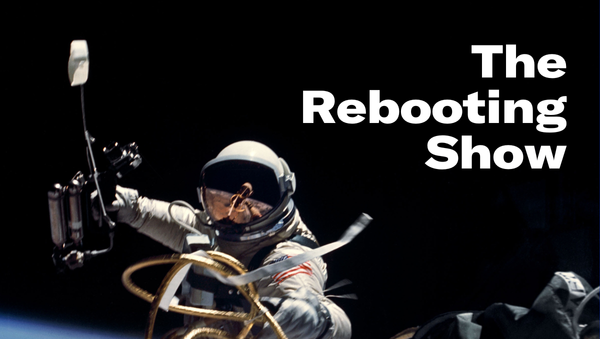Systemic failures
Screwups are inevitable, but investigating their underlying causes is essential

This is a slightly delayed August version of The Rebooting since I just returned from two weeks in Europe. Last week, I wrote about embracing uncertainty, something we’ve all needed to do during this seemingly neverending pandemic. This week, I’m turning to another pandemic-related subject: systemic failure. Also, my regular request: Please share this newsletter since that’s how most people discover new newsletters.
Humans are conditioned to look for simple answers to complex problems. This impulse is exacerbated when things go wrong. That’s when fingers start to get pointed, usually at a person or group of people for screwing up. And in many cases, someone did screwup, but unpacking why they messed up and how to avoid future screwups or even if measures to prevent screwups are worth the cost is more valuable. The pandemic has not only given all of us a lesson in exponential growth, it’s also shone a light on systemic failure.
Last week, I read The Premonition, Michael Lewis’s reliably insightful and well-told view of the faltering U.S. response to Covid. What I like about Lewis is he digs into the mundane and brings it to life with his storytelling skill. In The Premonition, he spelunks into the sprawling U.S. government bureaucracy and public health system in order to shine light on what was a systemic failure. On just about every level, the system let us down.
People will want to just say “Trump” or “China” and call it a day. I understand that because we’ve all lived through that kind of knee-jerk response to failures. Most of us deal with far more mundane failures, like emails that are sent at the wrong time or arrive blank. When those mishaps happen, the first instinct of many is to look for someone to blame. After all, it has to be someone’s fault. But that’s emotional and frankly poisonous for organizations. That’s because people end up being conditioned to avoid screwing up as the first order of their jobs. You end up incentivizing box checking and ass covering, not problem solving. Lewis quotes a frustrated local public health official ripping the CDC for having a culture that produces “malignant obedience.” What’s more, we repeated an amazing number of mistakes from the 1918 pandemic. (Everyone should read John Barry’s The Great Influenza. We basically ran it back a century and change later.)
I believe in a more productive view of failure, not in the LinkedIn post fetishization of it (thanks, Silicon Valley), but viewing screwups more analytically. Sometimes a mistake is simply human error. But humans operate within systems. Nobody gets up in the morning and thinks, “Today I want to suck.” More often than not, they’re in some sense victims of bad processes or decisions made in building the system in which they operate.
Several years ago, at a time when Digiday was quite small, we published an installment of our Confessions series that nearly sank the company. We started Confessions out of frustration: Everyone in the industry was incentivized to be full of shit. The only way around that was not to rewrite press releases or run soul-sucking Q&As with CMOs about “brand purpose” and instead dive deep into organizations to find those on the front lines to give an honest view of the true challenges and misplaced incentives in the media business. The only way to do this was through anonymity, although we vetted closely those we gave anonymity. The rules were: No specific accusations or score settling against individuals (that can be libel) or mostly against specific companies (similar risk). There was a gray area with giant platforms like Google and Facebook because they’re not participants in the media environment; they are the environment.
In any event, this Confession dug into the sketchy underbelly of programmatic advertising. This was an issue we tried to own. Agencies at the time were setting up trading desks and embracing programmatic (and its complexities) not just as a better way to allocate client ad dollars but as a way for the agencies themselves to make more money. I think it’s safe to say many agencies pushed the envelope in their role as “agents” as they became participants. The particulars of this Confession aren’t too important, but it made specific allegations against a large ad tech firm and large ad holding company. That should have been flagged but it wasn’t.
As the editor this was my fault ultimately. I was traveling for one of the incredible number of events we were doing, and the editor in charge didn’t catch the problem. Normally, the piece would have had multiple sets of eyes on it, particularly since it was done by a very junior reporter. But we set up a system that was very thin on the editor layer in favor of deploying scarce resources to the on-the-ground reporting. It’s a choice, but it carries with it risk since everyone needs backup. What’s more, operating a robust events business meant I was often somewhere else. We didn’t build in redundancy.
The result was a series of legal threats that could have been disastrous. The companies named were never contacted and should have been. At the same time, I was adamant we couldn’t delete the story. That’s always the easy way out that many non-journalists gravitate to. After all, that will normally placate the aggrieved. But to me, you correct and give the companies their say rather than take the easy way out and hope nobody calls you on it. Ultimately, the threats went nowhere and a lawsuit was never filed.
The way to solve this challenge was to fix the system and have more editors. Pointing fingers at the reporter or editor wasn’t going to solve it. With this kind of risk, the investment in making the system more resilient was worth it. Other times -- a blank email because of a tech error and not having someone up at 5am to test every day -- the solution wasn’t worthwhile. If you send enough email, some will be screwed up. Most people understand that; there’s no need to then send a groveling apology email.
I thought of this unpleasant experience when reading the frustrating mishaps in the government response to the pandemic. The failures were in many ways inevitable. We do not have a public health system, but a fragmented patchwork of health authorities with overlapping authority. What’s more, the CDC wasn’t up for the task at hand, more an academic organization than a nimble front-line commander in the trenches. They were classic whiteboard people.
My hope is we have a 9/11 Commission for the pandemic that focuses on these systemic failures rather than a political goat rodeo that is about winning the next election or raising more money. Mistakes are inevitable, but when they happen, I always urged us to look to the system in which the decisions were made. Just about always the failure wasn’t an individual’s, but a result of choices, either actively made or simply not made, that made the mistake inevitable.
Thanks for reading this week. I hope everyone is getting away for a break this August. I’m thinking more about how The Rebooting evolves in the fall. I’d love to hear from you about what you’d find valuable, whether it’s case studies, interviews, practical guides, whatever. You can reply to this email or send me a note directly at bmorrissey@gmail.com. Finally, if you’re not a subscriber, sign up to get this newsletter every Wednesday.




